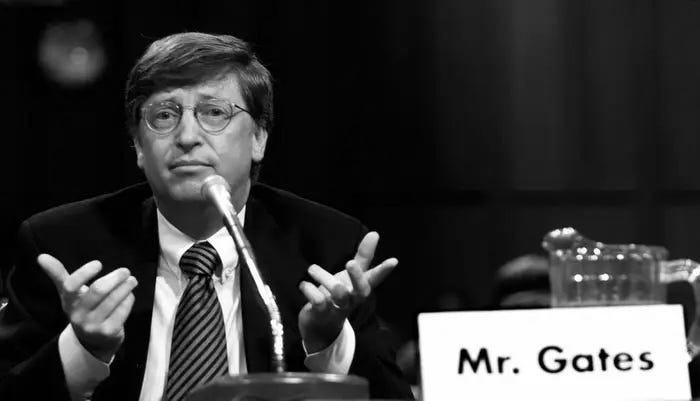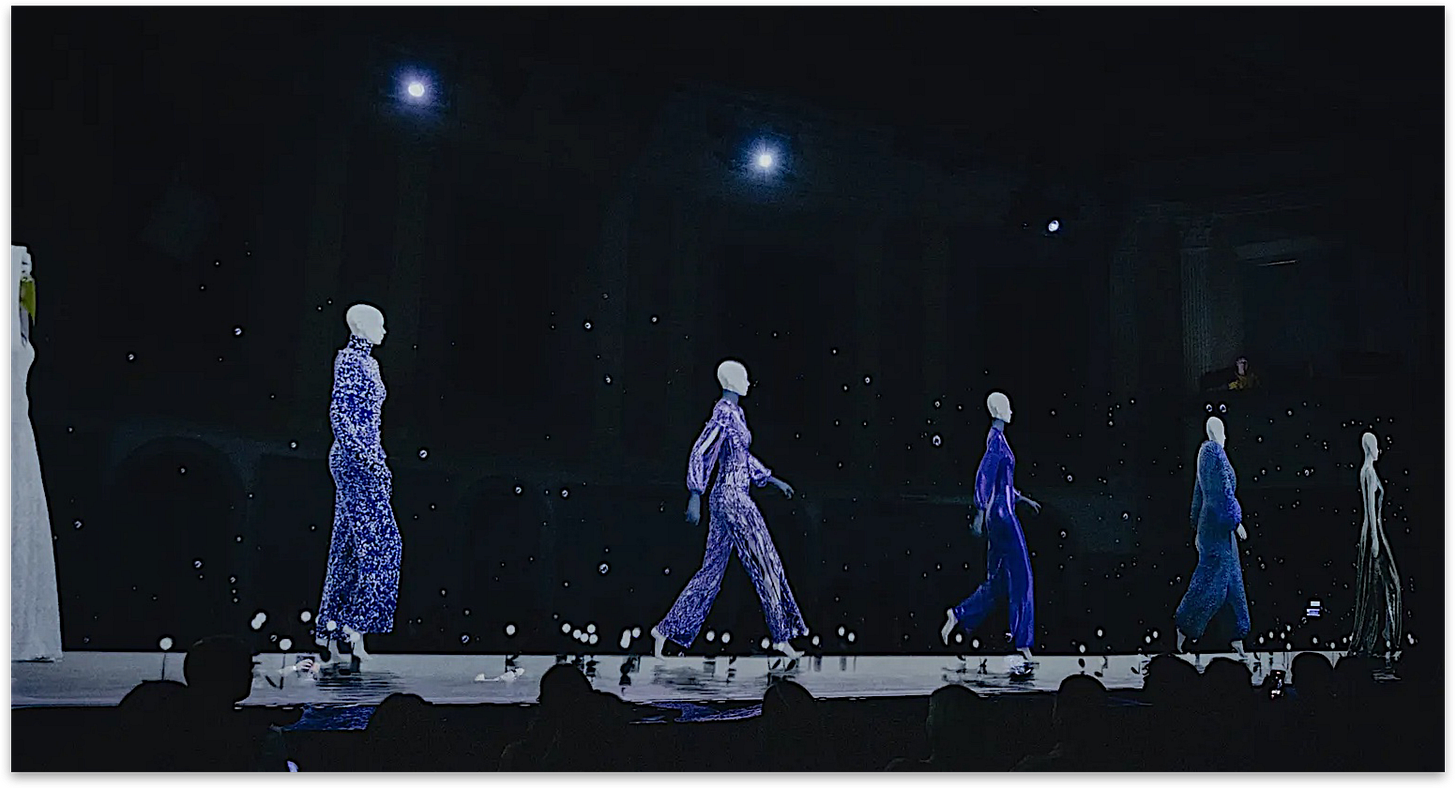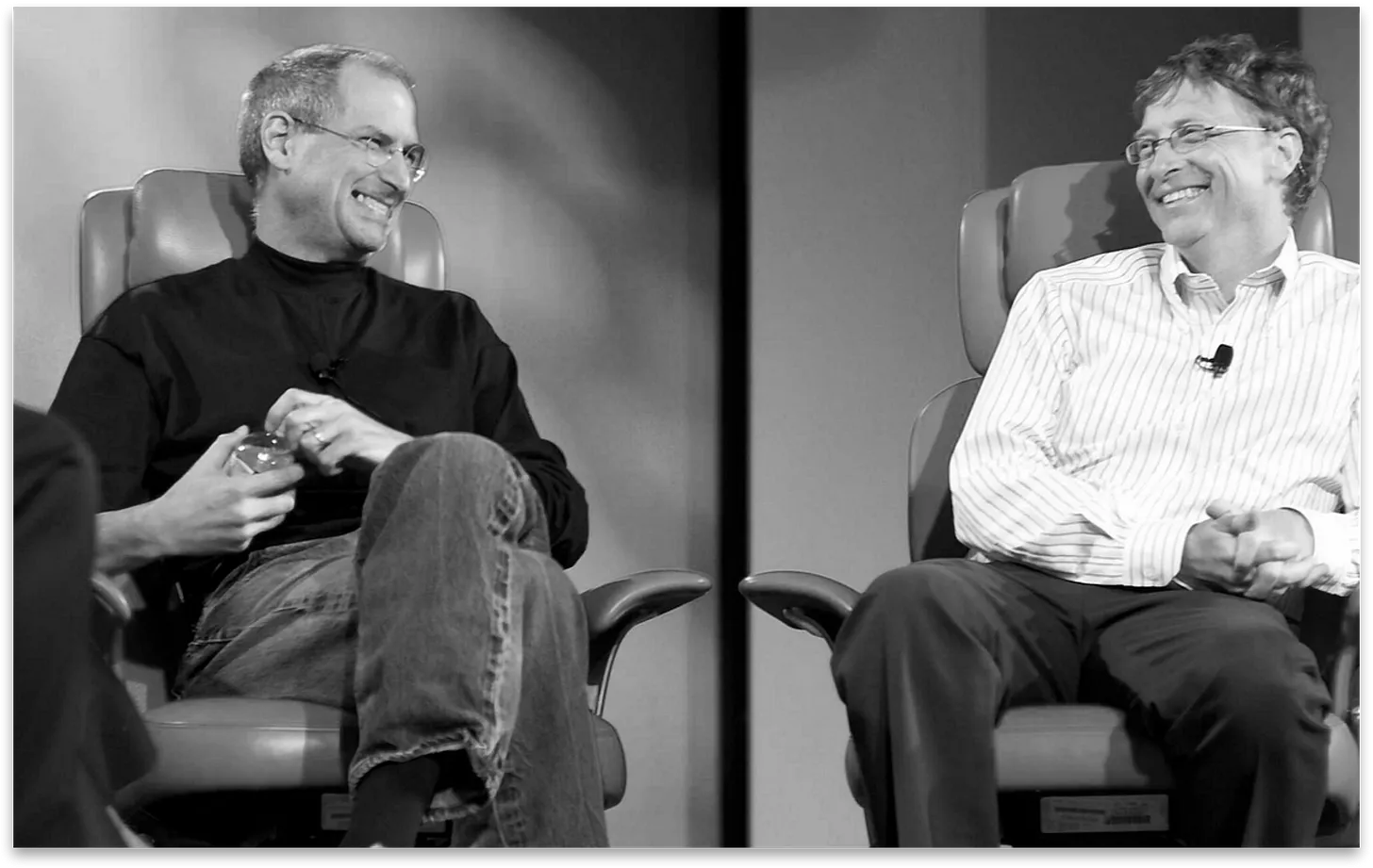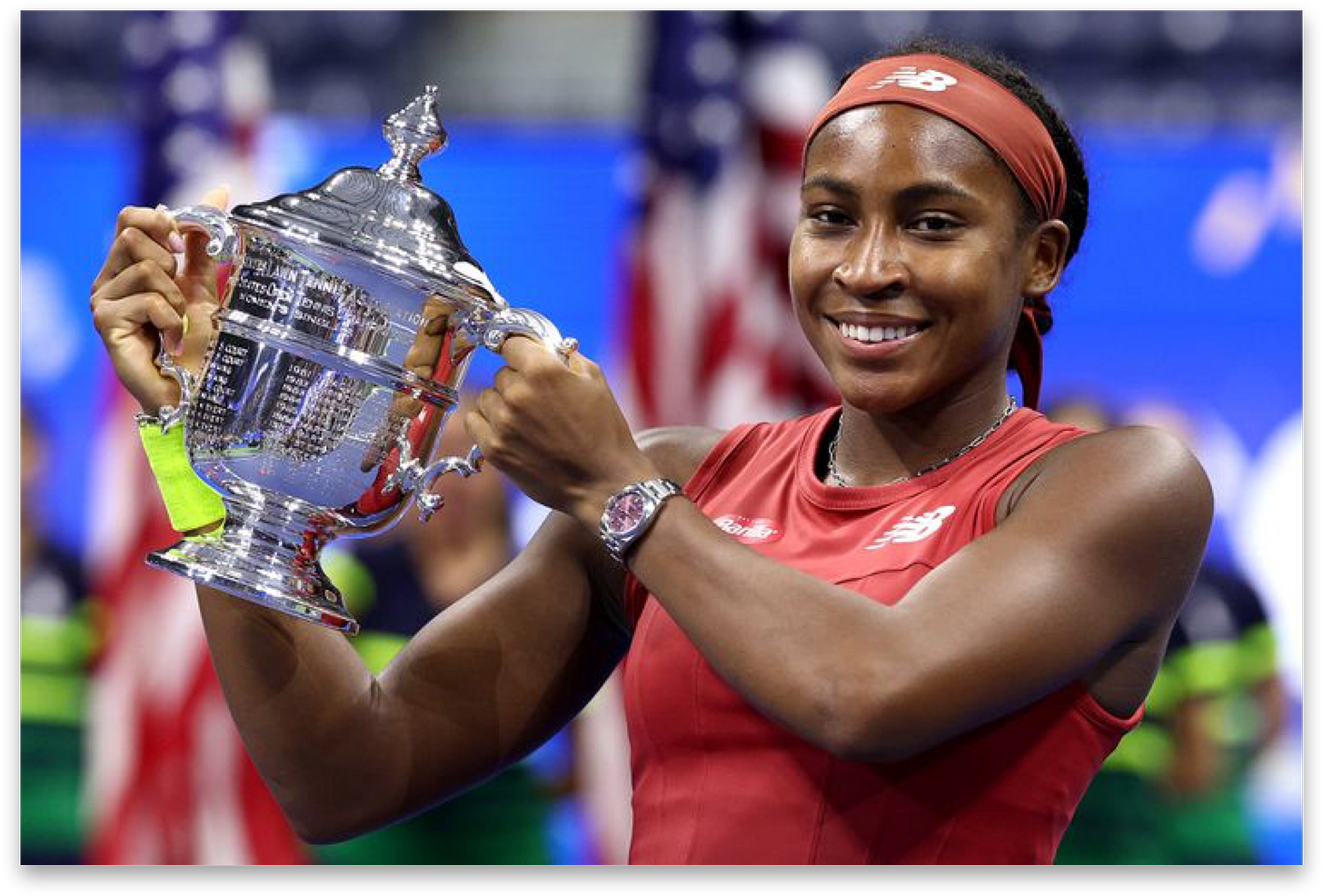Bill Gates shorts Tesla, Universal Music takes on AI, Google vs. Uncle Sam, NYC to London in 90 minutes, what powers Elon, naps grow brains, and other thrilling news...

How the threat of AI (and noisy music) inspired Universal Music to cut an industry-saving deal
Lucian Grainge, the CEO of Universal Music Group (UMG), just cut a deal with French streaming service Deezer where professional artists will get a greater share of royalties than the bots and white noise soundtracks flooding the streamers.
‘This is the biggest change to the model in 15 years,’ says Jeronimo Folgueira, Deezer’s chief executive. It will also save the record labels, a fate that is looking highly unlikely for the film and TV studios.

The gravitas behind Mr. Grainge’s negotiating power for an ‘artist-centric’ model comes from being the boss of the biggest music label on the planet that enjoys a cut of the royalties earned by superstar artists such as Taylor Swift, Drake, and The Weeknd.
The new royalty model rolling out next month
Attribute a double stream weighting to ‘professional artists’ who have a minimum of 1,000 streams per month by a minimum of 500 unique listeners.
Rewarding content that fans actively engage with a 4x weighting for artists and reducing the economic influence of algorithmic programming.
Demonetizing non-artist noise audio
Tackling fraud by driving an “updated, and stricter, proprietary fraud detection system and removing incentives for bad actors.
This payout model ‘reduces the risk of an exponentially growing AI content tail that no one values because it shifts pricing from volume to value-based,’ music industry analysts at JP Morgan report. ‘In a dystopian AI world, we could easily move from 100-150m songs on DSPs [streaming platforms] today (vs. just 30m in 2015) to a billion + songs in a few years.’ Of those potential 1 billion-plus songs, JP Morgan estimates that ‘over 95% of them would be AI-generated.’
The JP Morgan note sums up its Investment Thesis around UMG: ‘We see UMG (Universal Music Group) as an extraordinary, must-own asset.’
Have faith—Life after Google is rapidly approaching
Google pays its partners big to be your default search—Who cares?
Google is facing the biggest tech monopoly trial since the Microsoft antitrust case in 2001. The US Justice Department alleges that Google’s search engine monopoly is illegally maintained by paying more than $10 billion a year to tech rivals, smartphone makers, and wireless providers in exchange for being the default phone and web browser. Google argues the company has won market share because it has the best search engine, not because of a lack of competition.

In a similar move as in the Google case, The Feds alleged Microsoft was using its monopoly position in the PC operating system market to strong-arm PC manufacturers and users to not uninstall its Internet Explorer browser and make it harder to use the competitive browsers of the day, Netscape and Java.
Outside of Hawaii and Alaska, Silicon Valley is located in the furthest spot away from Washington, DC, as possible, for a reason. Like the 1960s radicals, we are naturally suspicious of central authorities and lean toward unfettered innovation.

Case in point. In 2001, Microsoft owned 93% percent of the OS market, with Mac at 2.9% and the Linux OS at 2.3%, which was expected to blow by Apple soon. It wasn’t the Feds that turned these numbers upside down. It was Steve Jobs’s return to Apple in 1997, his object-oriented NeXT OS that became the Mac OS X, the iPhone, and Google’s Android.
Oh, and about the Internet Explorer browser, Microsoft was beating over everyone’s head? It’s no longer, and neither are the Netscape and Java browsers Bill Gates was so worried about. Today, Google’s Chrome owns 63% of the browser market, Apple’s Safari is 20%, and Edge is at 5% the rest fall below. You can't control what you can't predict.
Silicon Valley operates on a faith that clever new entrepreneurs will invariably step up with new innovations to keep the Goliaths trying to play bully in check. We have proven this over and over again.
And trust us, as with the old Twitter, Google, and Facebook are mistrusted brands and viewed as traitors to the Silicon Valley spirit for selling our personal data on the attention span exchange. Why do you think Google and Facebook changed their names (that no one utters) and Twitter was forced to sell?
Web3 is all about taking our power and privacy back—which is happening—and we don’t need the ‘help’ of yet another central authority we do not trust to solve the challenges they think we have. Thank you very much.
Did you know?
Overheard on the streets of the global Silicon Valley. Got any hot insider tips? Email us @ theeditor@cryptoniteventures.com
The Billionaire Boys Club
What did we learn about the mercurial tech entrepreneur from Walter Issacson’s much-hyped ‘Elon Musk’ bio?

Elon grew up in South Africa with an emotionally abusive father and a masochistic mother, and the self-described ‘Asperger-y guy’ channeled his childhood agony into an unstoppable entrepreneurial drive.
Elon showed some self-reflection in his opening monologue as host of a Saturday Night Live episode. ‘To anyone I’ve offended, I just want to say I reinvented electric cars and send people to Mars in a rocket ship. Did you think I was also going to be some chill, normal dude?’
Elon fell in love with musician and performance artist Grimes (the mother to three of his ten children) when she compared his power to that of the Middle Earth wizard Gandalf and subsequently passed Elon’s rapid-fire trivia test on The Lord of the Rings.
Elon’s younger brother, Kimbal, describes Amber Heard—whom Elon dated for a year after her break-up with Johnny Depp—as ’a toxic nightmare.’ She really is a very good actress, so you wonder if she is telling you the truth, but she isn’t. She reminds me of our dad.’
Elon loves playing video games for stress relief. After a tense argument with engineers over the need for safety chains when moving the Starship booster, Musk retreated to playing two intense games of Polytopia with Neuralink executive Shivon Zilis, who secretly gave birth to his twins. ‘He just absolutely crushed me in both games,” Ms. Zilis said.
In a meeting with Bill Gates, who wanted to discuss philanthropy efforts around climate change, one of the first questions Elon asked Bill G. was whether he was still shorting Tesla, to which he answered yes.
His takeover of Twitter was a way to combat the ‘woke-mind virus, which is fundamentally anti-science, anti-merit and anti-human in general,” he told Walter, adding ‘Civilization will never become multiplanetary.’
Out of fear Russia would launch a nuclear attack in response, Elon refused to allow Ukraine to use SpaceX’s Starlink satellite communications to launch a surprise drone submarine attack on Russki forces in Crimea last September.
A great excerpt from the book tells the story of how Elon and his ‘musketeers’ from Tesla and SpaceX moved some servers from Sacramento to Portland to save money, which shows his ‘maniacal sense of urgency’ at X.

Do you want to fly from NYC to London in 90 minutes? Well, good news! Pentagon-backed aviation firm Hermeusunveiled plans for a Mach 5 engine-powered 20-passenger jet that can hit 3,850 mph—5x the speed of sound or twice as fast as a Concorde. Steve Case, a cofounder of AOL and VC fund Revolution, is a major backer of the company with Georgia Tech roots.
VC Whispers
Sequoia and Andreessen, which each invested $50M in Instacart in 2021 at the top of the market, are taking huge hits due to the company’s 75% plunge in valuation since their investments. The grocery delivery company’s IPO prospectus says the stock price will be $28 ($10B valuation) versus the $125 price ($39M valuation) the two powerhouse VC firms paid just 2 years ago.
AI Tracker
The CEO of Pigeon Shrine, Tom Paton, says their studio uses generative AI and virtual tools to streamline workflows. ‘Producers can channel all their energy towards the creative process that values unique human expertise, allowing independent films to be more efficient and scale to new heights.’
20 Silicon Valley CEOs, ethicists, academics, and consumer advocates met with 60 senators to prophesize AI’s ‘civilizational risks’ and the need for a public ‘referee.’ Elon, Bill Gates, Zuck, Sundar Pichai, and Sam Altman (OpenAI) were on hand for the historic closed-door brainstorming session.
Best on the Block
Coinbase will integrate the layer-2 payment protocol Lightning Network. ‘Bitcoin is the most important asset in crypto, and [Lightening] will enable faster and cheaper Bitcoin transactions for our users…but it will take some time to integrate, so please be patient,’ Coinbase CEO Brian Armstrong Xed.

JPMorgan plans to save millions with blockchain-based financial instruments. ‘We can tokenize US Treasurys,’ says Tyrone Lobban. ‘We can tokenize cash in the form of JPM coin and use smart contracts to mark exact times to trade assets and when the funds will be returned.’
On Hollywood
Amid the ongoing strikes, Apple TV+ has suspended a wide swath of deals with actors and producers. Among those who had been previously announced as having deals with Apple include Tom Hanks and Gary Goetzman’s Playtone, Martin Scorsese’s Sikelia Productions
The Grammys boss has cleared up misconceptions regarding the eligibility of an AI-generated Drake song Heart on my sleeve for an award nomination in an Instagram video.
“Even though it was written by a human creator, the vocals were not legally obtained, the vocals were not cleared by the label or the artist, and the song is not commercially available, and therefore not eligible for Grammy consideration.”
—Harvey Mason Jr., CEO of the Recording Academy, host for the annual Grammy Music Awards
Does this mean if Drake and his label cleared Heart on my sleeve (or a new AI single above that just popped), would they be eligible for a Grammy? The sad reality is most vocals and instrumentation we listen to today are tampered with—Who cares if this sound comes from a robot? Soul left the music industry a long time ago.
Going Green
Bill Gates-backed Antora Energy is making big batteries to help factories transition to clean energy. “We’ve developed a new class of thermal battery, which stores solar and wind energy as heat instead of as electrochemistry or electrochemical bonds, which is much cheaper,” said Justin Briggs.
Amazon is purchasing a quarter of a million metric tons of air-captured carbon stored underground over the next decade from 1PointFive. Microsoft has agreed to buy carbon credits from California-based startup Heirloom Carbon, which uses limestone to remove carbon from the atmosphere.
Follow the Crypto
Ethereum inventor Vitalik Buterin beamed in the Permissionless event in Austin and seemed most enthused about decentralized social, noting invite-only alpha Farcaster, an X-like protocol built on the OP mainnet, and Lens, developed on Polygon’s chain by Aave-founder Stani Kulechov as examples of using crypto tools to compete with centralized platforms.
Putting your BTC where your mouth is. CNBC reports that a filing shows Robert Kennedy Jr. owned between $100K and $250K in Bitcoin in June, an investment made after speaking at Bitcoin 2023 in May in Miami, where he announced his campaign would be the first to accept Bitcoin donations.
According to NFTGo, the NFT market cap in USD is down 41%, and its volume has dropped 67% in the last 12 months. NFT market sentiment is now ranked 13 out of 100, with an overall rating of ‘cold.’ On the other hand, the value of ‘utility’ NFTs is on the rise as NFT projects add new functionality.
Decentralized exchange (DEX) Brine Fi has raised $16.5M at a $100M valuation led by Pantera Capital. Brine Fi, powered by the Ethereum-based scaling system StarkWare, is a non-custodial, decentralized order book that allows privacy for trading positions via so-called zero-knowledge proofs.
Into the Metaverse
Pahdo Labs raises $15M, led by Andreessen Horowitz (a16z), to let users play anime-style action role-playing games (RPG) with AI tools.

A packed house of over 1,000 guests at Amsterdam Fashion Week was wowed by a hologram catwalk of avatars produced by Future Front Row. Digital fashion has mainly been viewed as gimmicky, but FFR’s designers created more of a ‘storytelling and strong emotive presence,’ said one guest.
Entrepreneurial Huddle
USA’s Coco Gauff defeated Aryna Sabalenka of Belarus in the women’s singles final of the US Open tennis championships last week in New York.
“The French Open loss was a heartbreak for me. I realized God puts you through tribulations and trials. This makes this moment even more sweeter than I could imagine. I don’t pray for results. I just ask that I get the strength to give it my all. Whatever happens, happens. I’m so blessed in this life. I’m just thankful for this moment. I don’t have any words for it, to be honest.”
—Coco Gauff joined Serena Williams and Tracy Austin as the youngest Americans, male or female, to win a US Open.
Straight outta Silicon Valley

Seems like the only chatter out of Apple’s annual showcase is the new iPhone 15’s switch to a USB-C cable as its ‘universally accepted standard.’ The iPhone and Watch have matured, and disrupted new features are hard to come by. The other more cryptic murmur was Apple’s innovation died with Steve Jobs.
Chaos & Complexity
If you don’t want the Gen Z crowd to call you out as a ‘tragic millennial,’ don’t part your hair on the side, wear skinny jeans with your sunglass too high up on your nose, use laughing emojis, act like a ‘Disney adult,’ or think of Harry Potter as a personality trait.
What the Math Says
PitchBook’s 2023 top 100 colleges list ranks by startup alumni founders who have raised venture capital in the past 10 years.
Stanford is No. 1 overall in the undergraduate and graduate rankings. UC Berkeley trails at No. 2 by just two founders.
Harvard’s MBA program is far and away the top school for founders with business degrees—its 1,691 alumni founder count is 55% more than No. 2 Stanford.
In Europe, Oxford is No. 1 for undergraduate alumni, but Cambridge is the top among graduate school alumni.
Know Thy Enemy
‘Over the next decade, the most significant change agent will be the disruptions brought about by AI across all sectors,’ Alibaba’s new CEO, Eddie Wu, said in a letter to employees. ‘If we don’t keep up with the changes of the AI era, we will be displaced.’ Mr. Wu, who cofounded Alibaba with Jack Ma, officially took the helm last week.

After entering Russia aboard his armored train last week, North Korean dictator Kim Jong Un met President Vladimir Putin and visited weapons and technology sites, underscoring deepening ties between the two nations locked in separate confrontations with the West.
Revive Thyself (or not)
Research shows that food brands owned by tobacco companies disseminate hyper-palatable foods loaded with salts, fats, and sugars. This junk food is addictive and hard to resist and makes up the lion’s share of what’s marketed to Americans.

Daytime napping preserves brain health and slows brain shrinkage with age, according to a University of Uruguay study of people between 40 and 69. Using genetic data, researchers found that those genetically inclined to nap had larger brain volumes, linked to lower dementia risk.
Flashback Interview
Gates vs. Jobs: The Rematch—circa 2000
Until Steve Jobs's return to Apple in 1997, innovation in the PC industry was stagnant. In 2000, Tony Perkins predicted the rise of Apple on the eve of the OS X and 7 years before the iPhone.

On March 13, 2000, Cryptonite’s Anthony Perkins, then editor-in-chief of Red Herring magazine and co-author of ‘The Internet Bubble’ (HarperCollins, 1999), wrote this editorial for the Wall Street Journal.
Apple Computer’s iCEO, Steve Jobs (the ‘i’ now stands for Internet rather than interim), tells a story about a recent dinner with Bill Gates in which they talked about how they used to be the youngest guys in the business, and now they are the graybeards. That both men are just 44 is ironic enough. More profoundly, Mr. Jobs and Mr. Gates find themselves once again, after a 15-year reprieve, locked in head-to-head competition over the leadership of the personal computer industry.
This last statement may surprise you. How can Apple Computer, with barely over 3% worldwide PC market share, be a competitor to the mighty Microsoft? Sure, Mr. Jobs has guided the company he co-founded out of a garage in 1976 back to consistent profitability and revenue growth. Best of all, he has also increased Apple’s stock price tenfold since retaking command for shareholders. But will Apple become anything more than a computer maker for a high-end niche, the Porsche of PCs? “What’s wrong with owning 100% of the Macintosh market?” industry pundit Stewart Alsop used to say. And Mr. Jobs is certainly making a business out of Apple’s monopoly of the Mac market again.
To its credit, Apple has re-emerged as an industry player primarily because Mr. Jobs has focused on the company’s product development and marketing campaigns like a laser. He reduced the product line to four easily understood and well-differentiated classes of sleek machines, some packaged in vibrantly colored, translucent computer cases. He promoted these new creations with equally slick and fun advertising campaigns that made the 20 million existing Mac users feel young again and seduced a whole new generation into becoming Mac converts. Roughly 30% of iMac buyers are first-time PC users. Apple’s new buzz is summed up in the banner that adorns the company’s headquarters in Cupertino, Calif.: “The re-birth of cool!”
Current Wisdom
“I don’t think everybody in D.C. actually fully realizes how powerful the crypto voting community block is. 56 million people in the U.S. have already used cryptocurrencies. That’s 5x as many people that have an electric vehicle. I think 2024 is an election where the voters of America are really going to hold candidates’ feet to the fire and say, What is your position on crypto?”
—Brian Armstrong, Founder & CEO, Coinbase





